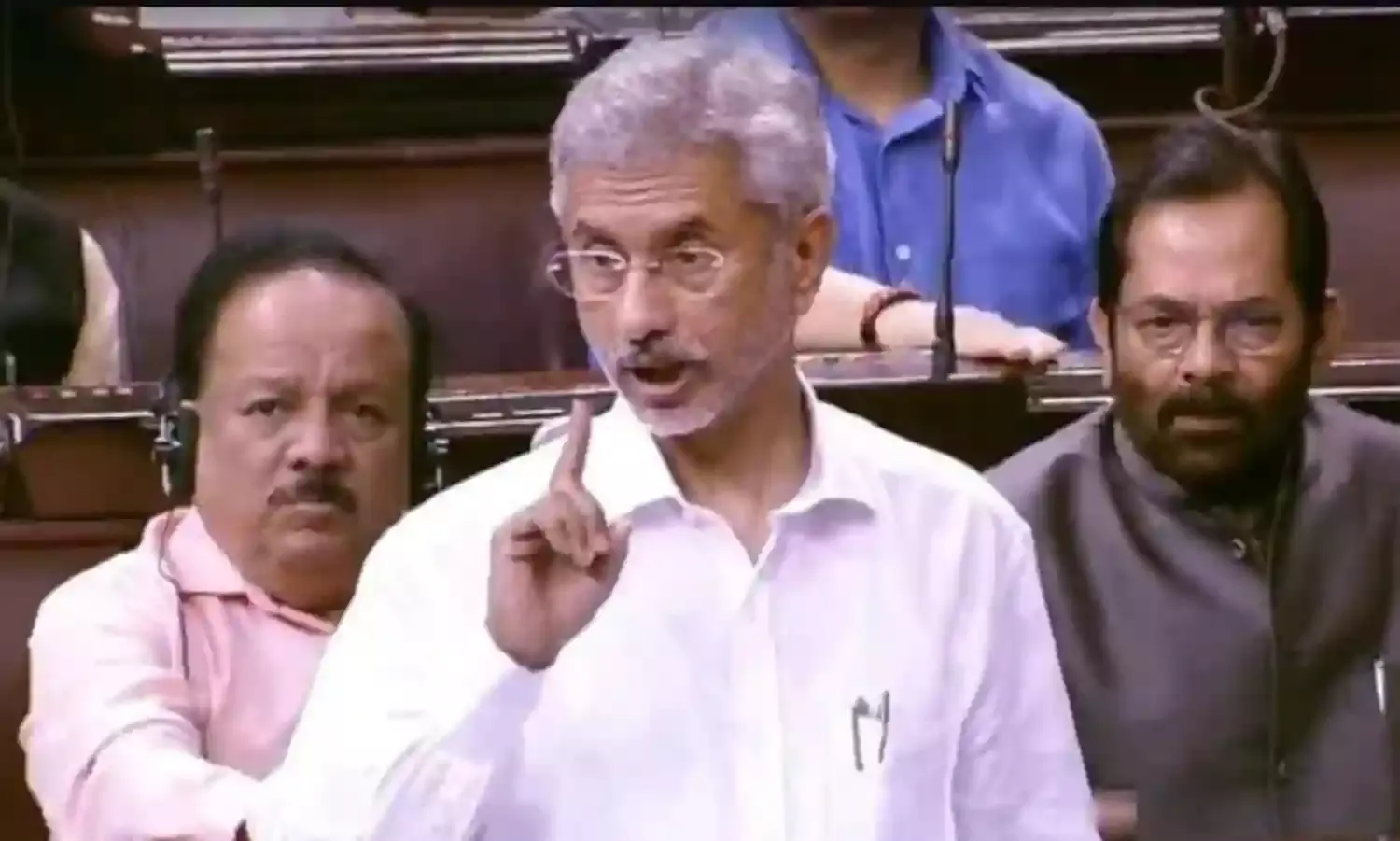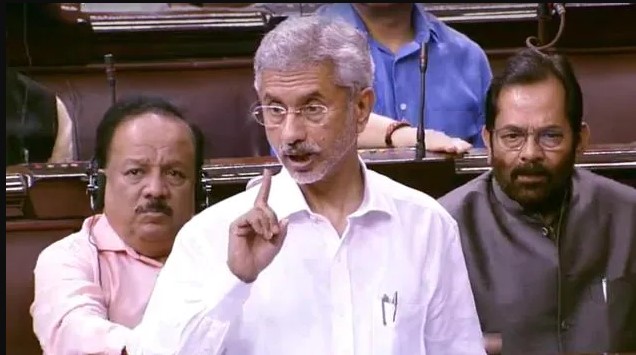India Changes Stance on Russia-Ukraine War
Pro-West position

India appears to have changed its stance on the Russo-Ukrainian war. Going by Foreign Minister S. Jaishankar’s statement in the Upper House of Parliament on March 24, India has dropped its insistence on taking into account the “legitimate security concerns of all countries” (a pro-Russian point). It is now talking of “respecting the territorial integrity of States” (a pro-West point) exclusively.
The change, which has taken a month to happen, could be attributed to six factors: (1) the failure of the Russian armed forces to meet its objectives within the envisaged time period; (2) mounting pressure from the Western powers on New Delhi to changes its stance; (3) the severity and the extent of Western sanctions against Russia; (4) China’s unrelenting hostility towards India especially its support for Pakistan on the Kashmir issue; (5) China’s encroachment in Nepal, Bangladesh and Sri Lanka, and (6) a realization that there is no room for Indian mediation in the Ukraine crisis, which was indicated earlier by Prime Minister Narendra Modi when he called upon the Russian and Ukrainian Presidents to settle their dispute themselves through direct talks.
Jaishankar told parliament on Friday that India is going by six principles on Ukraine: “One, we call for an immediate cessation of violence and an end to all hostilities. We stand for peace. Two, we believe that there is no other way than a return to the path of dialogue and diplomacy. Three, we believe, we recognize, that the global order is anchored on international law, the UN charter and respect for territorial integrity and sovereignty of all states. Four, we call for humanitarian access to the conflict area. Five, we ourselves give humanitarian assistance, we have given 90 tonnes of humanitarian assistance so far and we are looking at providing more, especially medicines. Six, we are in touch with the leadership of both the Russian Federation and Ukraine on this matter. We are very clear on our principles. Our policy is very much guided by our belief that the international order must respect territorial integrity and sovereignty of states.”
But earlier, on February 18, India’s Permanent Representative in the UN, T.S.Tirumurti, had told the Security Council that India’s interest was in finding a solution that can provide for immediate de-escalation of tensions “taking into account the legitimate security interests of all countries and aimed towards securing long-term peace and stability in the region and beyond.” It is significant that this condition is no longer mentioned and that the emphasis now is on the inviolability of territorial integrity and national sovereignty.
Last Monday, US President Biden had talked about an uncertainty in India’s stand describing it as “shaky”. On March 22, US Under Secretary of State for Political Affairs, Victoria Nuland, told NDTV in an exclusive interview, that “ India continues to evolve its position." She further said: "Democracies need to stand together and evolve their position vis-a-vis Russia because of the choices Putin has made. Democracies must stand against autocracies like Russia and China. Autocracies like Russia and China are showing what a level of threat they can be to peace and security."
The Russian invasion has been “vicious, violent and inhumane” Nuland said referring to maternity hospitals, apartment buildings, orphanages, schools, opera houses being shelled.
"I think there is an evolution in thinking going on here in India as well, and we see an evolution in position, but that's why it's important for us to talk,” the US official said.
Going further, Nuland said: “We know about the historic relationship and defense relationship between India and Russia at a time when the US was not prepared to have that kind of relationship. But times have changed now. They've changed in terms of the US and European willingness to be strong defense and security partners with India. We are doing more and more together in the Indo-Pacific. But times have also changed in terms of the level of brutality and violation of international humanitarian law that we are seeing."
Nuland also made an interesting proposal for the delivery Soviet-era defense equipment to India. She said: "We also talked about other opportunities for India to get what it needs including Soviet-era equipment, potentially not from Russia itself. We have been supporting the sourcing of security needs for Ukraine along with our allies including Soviet-era equipment and those are the kind of things we can do with India as it continues to evolve its position."
The US official said that the amount of energy that India buys from Russia is relatively small and "we have made it clear in our conversations that we understand that's not something India can cut off immediately".
When the US and other countries decided to cut off Russian oil imports completely, Washington did not expect "all democratic partners" to do so immediately, because of historical legacy, Nuland pointed out.
"But what we do want to do is to work together to find alternative sources over time. And that's what we hope to do with India - whether it's with regard to the security relationship, the energy relationship... Because Russia has proven itself to be unreliable and to be a violator of international law," she added.
Earlier, the Australian Prime Minister Scott Morrison and the Japanese Prime Minister Fumio Kishida, both India’s partners in QUAD, had urged Modi to change its neutral stand, even as they understood India’s dilemma.
In February, India and China had become strange bedfellows during the UNSC and UNGA vote on the resolution on the Russian invasion of Ukraine. Both abstained from voting saying that outright condemnation of one side would not help settle matters and bring about rapprochement and lasting peace. There were even some reports that India and China might coordinate mediatory efforts.
But that hope came to naught with Modi’s telling Australian and Japanese leaders that there could be no normalcy in Sino-Indian relations without tranquility on the Sino-Indian border. China has now publicly reiterated its support for the Pakistani case on Kashmir and repeated its case on sanctioning Pakistan-based terrorist Masood Azar.
Chinese Foreign Minister Wang Yi told the Organization of Islamic Cooperation (OIC) conference held in Pakistan this month: "On Kashmir, we have heard again today calls of many of our Islamic friends. And China shares the same hope."
Shocked by this statement, days before his arrival in New Delhi for talks with Jaishankar and National Security Advisor Ajit Doval, the Indian External Affairs Ministry spokesman Arindam Bagchi said: "Matters related to the Union Territory of Jammu and Kashmir are entirely the internal affairs of India. Other countries, including China, have no locus standi to comment. They should note that India refrains from public judgement of their internal issues."
Be that as it may, Wang Yi will meet Jaishankar and Doval, though it is not clear as to what they will talk about other than giving their perspectives on the Ukrainian situation and the Sino-Indian border talks at the corps commanders’ level. It is learnt that China was more keen on Wang Yi’s trip to India than India was. New Delhi has reasons to be wary of China’ moves given its tough stand on the border issue and its continued efforts to breach the Indian hold on Sri Lanka, Nepal and Bangladesh.
According to Mohamed Zeeshan, Editor-in-Chief of Freedom Gazette, the domestic scene in India following the decisive victory of the Bharatiya Janata Party in the recent State Assembly elections may have boosted China’s confidence that any deal struck with India now will be secure. “Beijing may well see India as a useful partner in the global geopolitical game,” Zeeshan wrote in The Diplomat.




